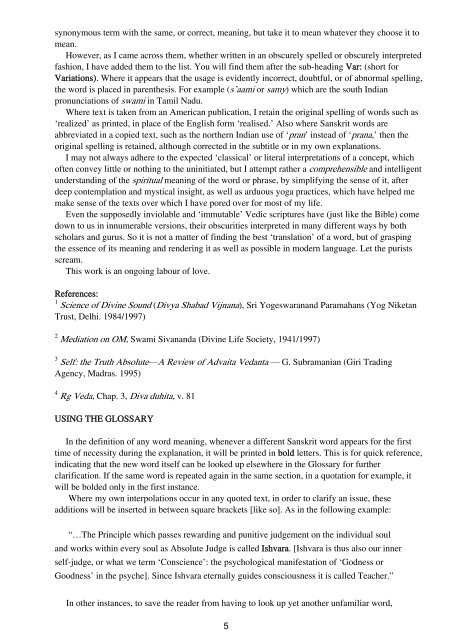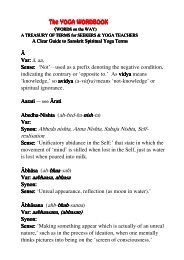Words on the Way - Muz Murray Mantra Yoga Master
Words on the Way - Muz Murray Mantra Yoga Master
Words on the Way - Muz Murray Mantra Yoga Master
You also want an ePaper? Increase the reach of your titles
YUMPU automatically turns print PDFs into web optimized ePapers that Google loves.
syn<strong>on</strong>ymous term with <strong>the</strong> same, or correct, meaning, but take it to mean whatever <strong>the</strong>y choose it to<br />
mean.<br />
However, as I came across <strong>the</strong>m, whe<strong>the</strong>r written in an obscurely spelled or obscurely interpreted<br />
fashi<strong>on</strong>, I have added <strong>the</strong>m to <strong>the</strong> list. You will find <strong>the</strong>m after <strong>the</strong> sub-heading Var: (short for<br />
Variati<strong>on</strong>s). Where it appears that <strong>the</strong> usage is evidently incorrect, doubtful, or of abnormal spelling,<br />
<strong>the</strong> word is placed in paren<strong>the</strong>sis. For example (s’aami or samy) which are <strong>the</strong> south Indian<br />
pr<strong>on</strong>unciati<strong>on</strong>s of swam in Tamil Nadu.<br />
Where text is taken from an American publicati<strong>on</strong>, I retain <strong>the</strong> original spelling of words such as<br />
‘realized’ as printed, in place of <strong>the</strong> English form ‘realised.’ Also where Sanskrit words are<br />
abbreviated in a copied text, such as <strong>the</strong> nor<strong>the</strong>rn Indian use of ‘pran’ instead of ‘prana,’ <strong>the</strong>n <strong>the</strong><br />
original spelling is retained, although corrected in <strong>the</strong> subtitle or in my own explanati<strong>on</strong>s.<br />
I may not always adhere to <strong>the</strong> expected ‘classical’ or literal interpretati<strong>on</strong>s of a c<strong>on</strong>cept, which<br />
often c<strong>on</strong>vey little or nothing to <strong>the</strong> uninitiated, but I attempt ra<strong>the</strong>r a comprehensible and intelligent<br />
understanding of <strong>the</strong> spiritual meaning of <strong>the</strong> word or phrase, by simplifying <strong>the</strong> sense of it, after<br />
deep c<strong>on</strong>templati<strong>on</strong> and mystical insight, as well as arduous yoga practices, which have helped me<br />
make sense of <strong>the</strong> texts over which I have pored over for most of my life.<br />
Even <strong>the</strong> supposedly inviolable and ‘immutable’ Vedic scriptures have (just like <strong>the</strong> Bible) come<br />
down to us in innumerable versi<strong>on</strong>s, <strong>the</strong>ir obscurities interpreted in many different ways by both<br />
scholars and gurus. So it is not a matter of finding <strong>the</strong> best ‘translati<strong>on</strong>’ of a word, but of grasping<br />
<strong>the</strong> essence of its meaning and rendering it as well as possible in modern language. Let <strong>the</strong> purists<br />
scream.<br />
This work is an <strong>on</strong>going labour of love.<br />
References:<br />
1 Science of Divine Sound (Divya Shabad Vijnana), Sri Yogeswaranand Paramahans (Yog Niketan<br />
Trust, Delhi. 1984/1997)<br />
2 Mediati<strong>on</strong> <strong>on</strong> OM, Swami Sivananda (Divine Life Society, 1941/1997)<br />
3 Self: <strong>the</strong> Truth Absolute—A Review of Advaita Vedanta — G. Subramanian (Giri Trading<br />
Agency, Madras. 1995)<br />
4 Rg Veda, Chap. 3, Diva duhita, v. 81<br />
USING THE GLOSSARY<br />
In <strong>the</strong> definiti<strong>on</strong> of any word meaning, whenever a different Sanskrit word appears for <strong>the</strong> first<br />
time of necessity during <strong>the</strong> explanati<strong>on</strong>, it will be printed in bold letters. This is for quick reference,<br />
indicating that <strong>the</strong> new word itself can be looked up elsewhere in <strong>the</strong> Glossary for fur<strong>the</strong>r<br />
clarificati<strong>on</strong>. If <strong>the</strong> same word is repeated again in <strong>the</strong> same secti<strong>on</strong>, in a quotati<strong>on</strong> for example, it<br />
will be bolded <strong>on</strong>ly in <strong>the</strong> first instance.<br />
Where my own interpolati<strong>on</strong>s occur in any quoted text, in order to clarify an issue, <strong>the</strong>se<br />
additi<strong>on</strong>s will be inserted in between square brackets [like so]. As in <strong>the</strong> following example:<br />
“…The Principle which passes rewarding and punitive judgement <strong>on</strong> <strong>the</strong> individual soul<br />
and works within every soul as Absolute Judge is called Ishvara. [Ishvara is thus also our inner<br />
self-judge, or what we term ‘C<strong>on</strong>science’: <strong>the</strong> psychological manifestati<strong>on</strong> of ‘Godness or<br />
Goodness’ in <strong>the</strong> psyche]. Since Ishvara eternally guides c<strong>on</strong>sciousness it is called Teacher.”<br />
In o<strong>the</strong>r instances, to save <strong>the</strong> reader from having to look up yet ano<strong>the</strong>r unfamiliar word,<br />
5



